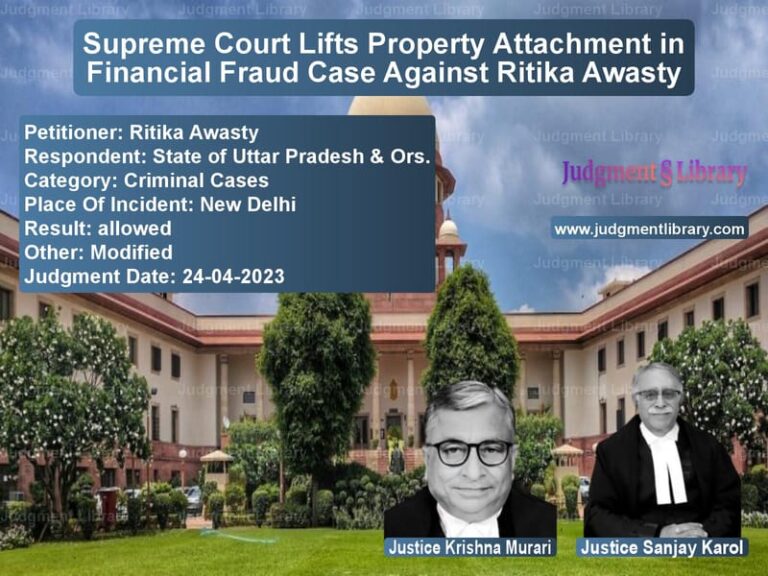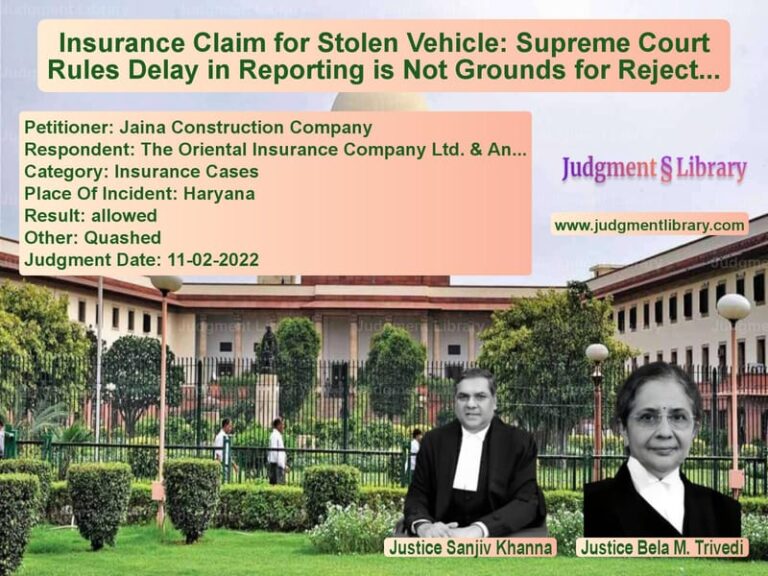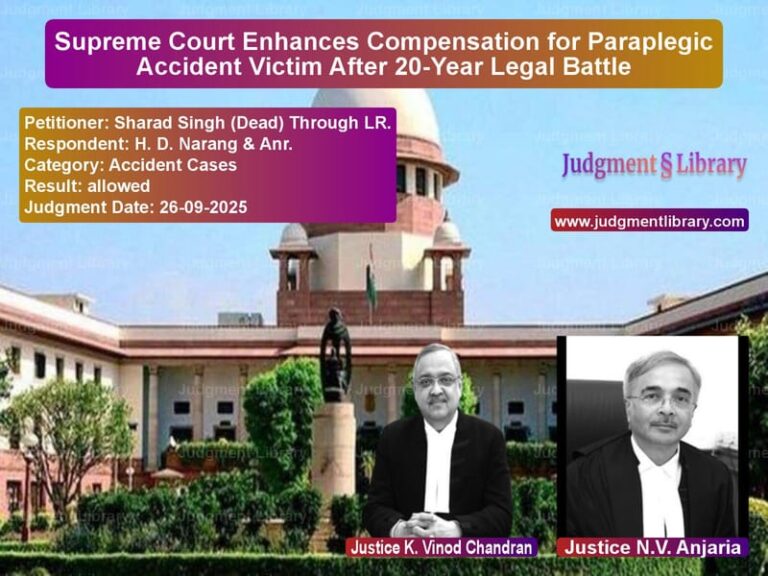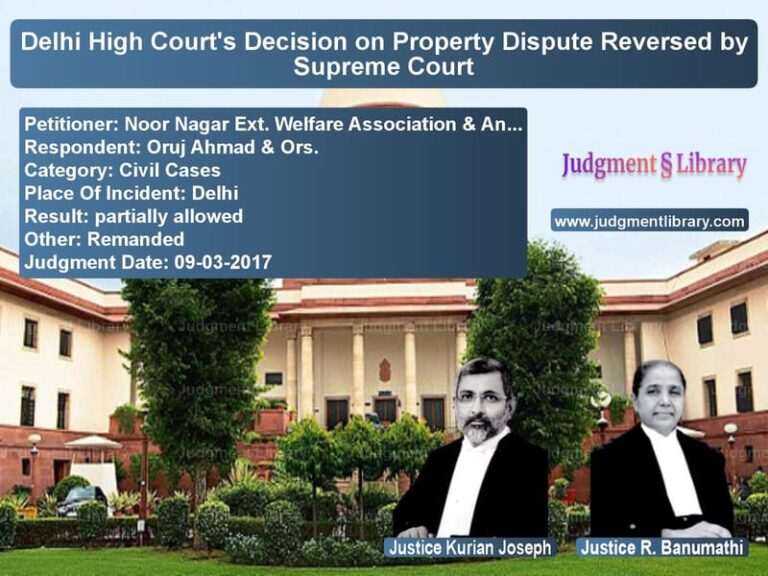Supreme Court Holds Hyundai Liable for Airbag Failure in Consumer Protection Case
The Supreme Court of India recently ruled in Hyundai Motor India Limited vs. Shailendra Bhatnagar, a landmark case addressing consumer rights and automobile safety under the Consumer Protection Act, 1986. The case revolved around the failure of airbags in a Hyundai Creta during a serious accident, leading to injuries to the owner. The Court’s ruling underscored the responsibility of automobile manufacturers in ensuring that safety features function as advertised.
Background of the Case
The respondent, Shailendra Bhatnagar, purchased a Hyundai Creta 1.6 VTVT SX+ on August 21, 2015. On November 16, 2017, he was driving on the Delhi-Panipat highway when his vehicle met with an accident. The right-hand front pillar, side body panels, and front suspension were significantly damaged.
Despite the impact, the airbags failed to deploy, resulting in serious injuries to the complainant. Hyundai conducted an investigation and claimed that:
- No crash data was recorded in the Supplemental Restraint System Control Module (SRSCM), which meant the sensors did not detect an accident.
- The accident impact was at an angle that did not trigger airbag deployment.
Dissatisfied with Hyundai’s response, the complainant filed a case with the Delhi State Consumer Disputes Redressal Commission, which ruled in his favor.
Legal Issues
- Whether Hyundai’s justification for airbag failure was valid under consumer protection laws.
- Whether failure of airbags constituted a manufacturing defect or an unfair trade practice.
- Whether the complainant was entitled to compensation for injuries and damages.
Arguments by the Parties
Hyundai Motor India Limited’s Arguments
- Airbag deployment depends on multiple factors, including vehicle speed, impact force, and collision angle.
- The accident impact was from the side, which did not affect the front chassis sensors.
- The complainant did not provide expert evidence proving a manufacturing defect.
Complainant’s Arguments
- The complainant purchased the vehicle based on Hyundai’s marketing of its safety features.
- Despite a severe front-right impact, the airbags did not deploy, leading to injuries.
- Hyundai failed to disclose the specific impact threshold required for airbags to deploy.
Supreme Court’s Judgment
Key Observations
- Hyundai’s explanation was insufficient as consumers expect airbags to work in serious accidents.
- The manufacturer failed to justify why airbags did not deploy despite extensive damage to the vehicle.
- Consumer rights must be protected when manufacturers fail to deliver on safety assurances.
Final Decision
The Supreme Court upheld the ruling of the National Consumer Disputes Redressal Commission (NCDRC) and directed Hyundai to:
- Pay Rs. 2,00,000 as compensation for medical expenses and loss of income.
- Pay Rs. 50,000 for mental agony suffered due to the accident.
- Reimburse Rs. 50,000 in litigation costs.
Implications of the Judgment
For Consumer Protection
- The ruling strengthens consumer rights by holding companies accountable for safety claims.
- It reinforces that manufacturers must ensure their products function as advertised.
For Automobile Safety
- The judgment highlights the need for greater transparency in airbag deployment conditions.
- It calls for stricter regulations ensuring that safety features meet real-world accident scenarios.
For Future Product Liability Cases
- The ruling sets a precedent that technical justifications from companies must be backed by clear, scientific reasoning.
- It ensures that consumer complaints regarding product safety are taken seriously.
Conclusion
The Supreme Court’s ruling in Hyundai Motor India Limited vs. Shailendra Bhatnagar marks a significant moment for consumer protection and vehicle safety laws in India. By holding Hyundai accountable for the failure of a key safety feature, the Court has reinforced that companies must not make misleading claims about product safety. The judgment serves as an important precedent for ensuring transparency in automobile safety and protecting consumer rights.
Petitioner Name: Hyundai Motor India Limited.Respondent Name: Shailendra Bhatnagar.Judgment By: Justice Aniruddha Bose, Justice Vineet Saran.Place Of Incident: Delhi-Panipat Highway.Judgment Date: 20-04-2022.
Don’t miss out on the full details! Download the complete judgment in PDF format below and gain valuable insights instantly!
Download Judgment: hyundai-motor-india-vs-shailendra-bhatnagar-supreme-court-of-india-judgment-dated-20-04-2022.pdf
Directly Download Judgment: Directly download this Judgment
See all petitions in Damages and Compensation
See all petitions in Consumer Rights
See all petitions in Contract Disputes
See all petitions in Judgment by Aniruddha Bose
See all petitions in Judgment by Vineet Saran
See all petitions in dismissed
See all petitions in Modified
See all petitions in supreme court of India judgments April 2022
See all petitions in 2022 judgments
See all posts in Civil Cases Category
See all allowed petitions in Civil Cases Category
See all Dismissed petitions in Civil Cases Category
See all partially allowed petitions in Civil Cases Category







